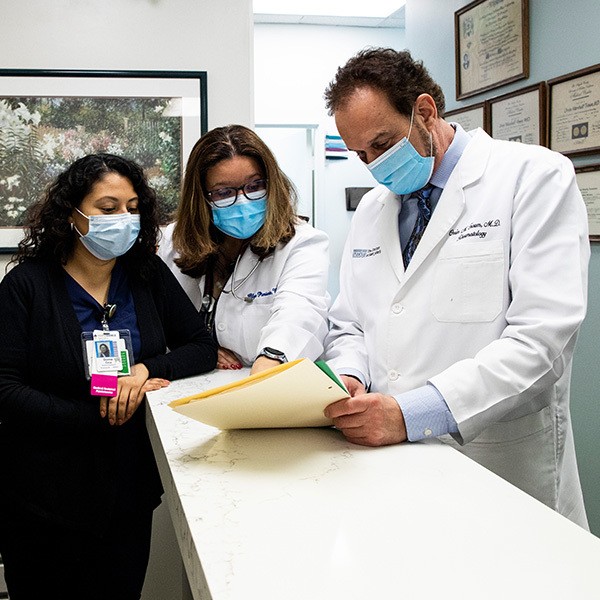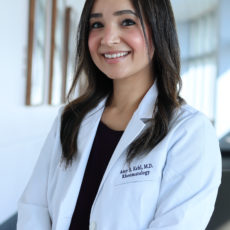Inflammatory Myositis

Overview
What is Inflammatory Myositis?
Myositis is an inflammation of the muscles. When caused by an autoimmune condition, it can present in several ways:
- Dermatomyositis
- Polymyositis
- Inclusion body myositis (IBM)
It is estimated that one in 100,000 people are affected by dermatomyositis and polymyositis. It can affect people of all ages and all ethnic groups. When properly diagnosed and treated, people can regain function and have a better life quality. Inflammatory myositis can occur alone or in association with other autoimmune conditions, such as Lupus, Sjogren’s, or Scleroderma.
Inflammatory Myositis Symptoms
Symptoms of Inflammatory Myositis
In general, Inflammatory Myositis symptoms can cause a loss of muscle strength overall and weakness around the large muscles of the neck, shoulders and hips. Patients with inflammatory myositis report weakness, presenting in difficulty doing their simple daily activities or getting out of a chair or bed. Other symptoms may include shortness of breath, cough, and choking while eating. Patients with Dermatomyositis may also develop a rash that appears as purple or red spots on the upper eyelids or as scaly, red bumps on the knuckles, elbows or knees. Patients with the disease also may develop white calcium deposits in the skin called calcinosis.
Inclusion body myositis (IBM) is an inflammatory and degenerative yet painless weakening of muscle. The first site of weakness may be the hands or forearms, with progression to the leg muscles or, in 30 – 40 percent of patients, the esophagus.
Diagnosis of Inflammatory Myositis
Diagnosis of Inflammatory Myositis
In addition to performing a muscle strength exam, your rheumatologist may order the following tests:
Blood Test
A blood test to measure the level of various muscle enzymes and myositis-specific antibodies
EMG
An electromyogram (EMG) to measure electrical activity in the muscles
Biopsy
A biopsy of a weak muscle
MRI
Magnetic resonance imaging (MRI) to detect abnormal muscle
Treatments for Inflammatory Myositis
Treatments for Inflammatory Myositis
Dermatomyositis and polymyositis are most often treated using immunosuppressive medications to reduce inflammation. These include corticosteroids such as prednisone. However, long-term use of these drugs is often accompanied by side effects such as weight gain, thinning of the skin and osteoporosis. Disease Modifying Antirheumatic Drugs (DMARDs) may be added to avoid long-term side effects and better attain long-range control of the disease. Some of the DMARDs used to treat these conditions are: Methotrexte, Azathioprine, Mycophenolate Mofetil. Other treatments that have been used as well are: IVIG, Rituximab.
IBM does not respond to corticosteroids or immunosuppressive drugs. Physical and occupational therapy may help maintain mobility in the joints or assist with swallowing difficulties.

Clinical Trials
Clinical Trials
The rheumatologists at Saint John’s Physician Partners have been integrally involved in the development of medications that treat inflammatory arthritis conditions for decades. They were involved in the clinical trials that led to the approval at the Food and Drug Administration (FDA) for medications that treat rheumatoid arthritis (RA), psoriatic arthritis (PsA), ankylosing spondylitis (SpA), osteoarthritis, and other bone and skin conditions like osteoporosis and psoriasis advanced therapies, some of which are biologic treatments.

Inflammatory Myositis Specialists
Inflammatory Myositis Specialists
Orrin Troum, M.D. and Amro Elbalkhi, M.D. provide consultation, diagnosis, and treatment for rheumatic diseases including inflammatory arthritis (rheumatoid arthritis, psoriatic arthritis, ankylosing spondylitis), scleroderma, myositis, gout, lupus, osteoarthritis, and osteoporosis. The Medical Doctors of Saint Johns strive to provide world class care and a personalized treatment plan for all patients and their families.


